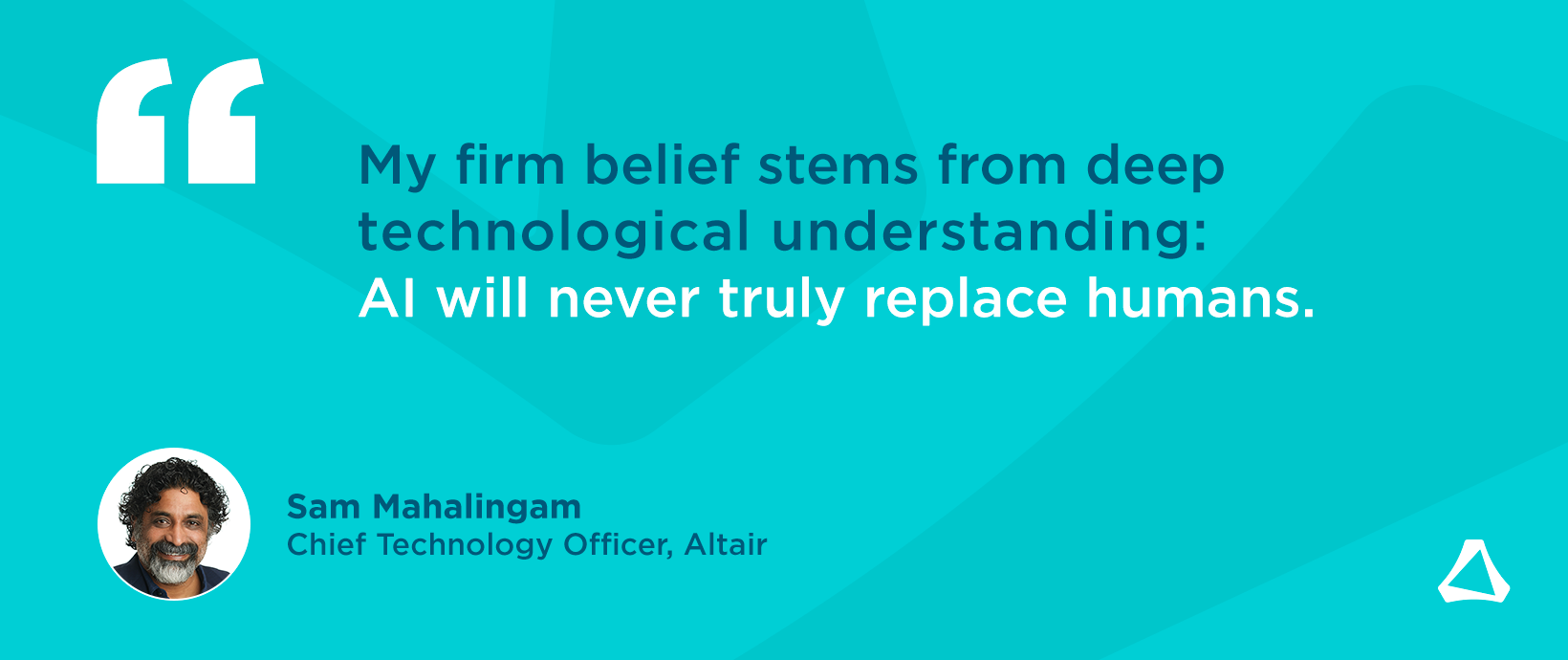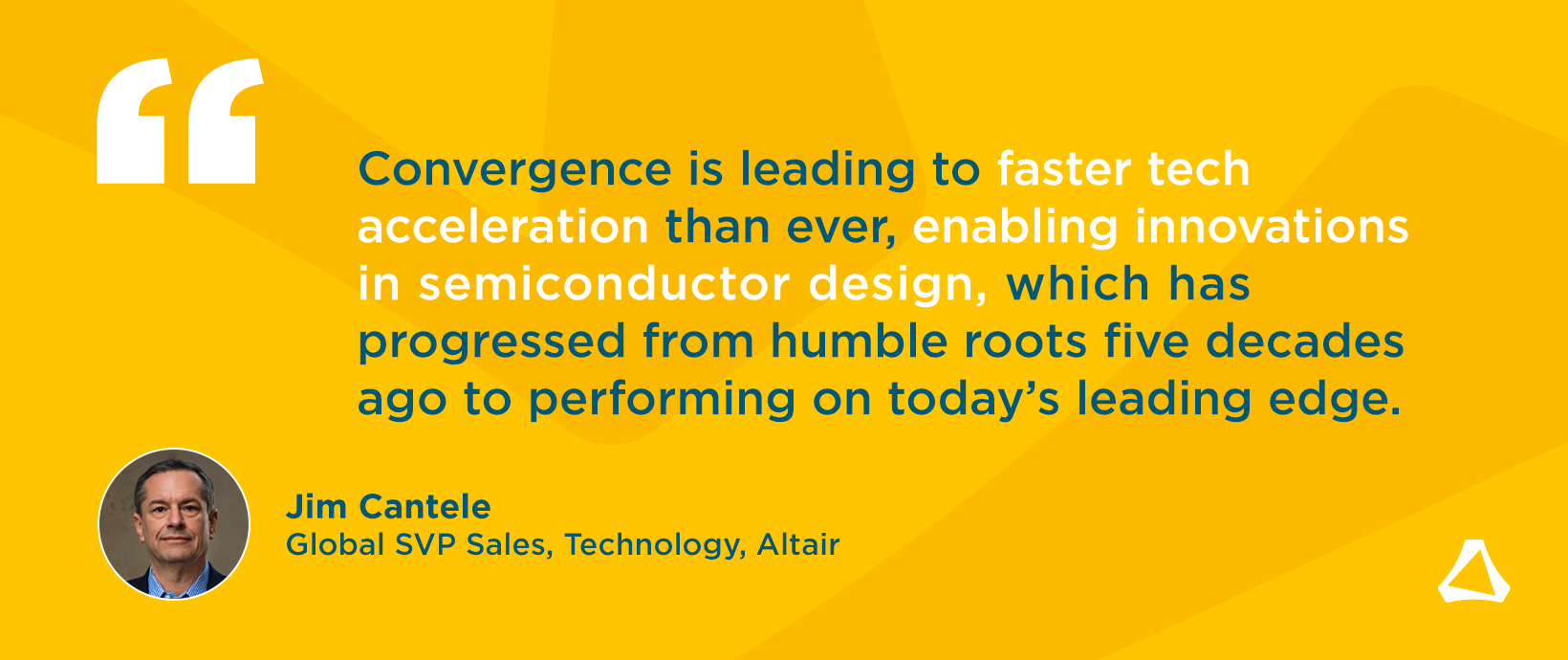What You Need to Know About Quantum Computing

You probably know something of the role Altair plays in the high-performance computing (HPC) community, but in a move that feels almost too cool and futuristic to be current news, Altair invested in a quantum operating system (OS) company, Riverlane, close to my home in Cambridge, U.K.
A couple of weeks ago, I attended the annual Riverlane Quantum Computing Theory in Practice (QCTiP) conference to find out more about what the quantum computing (QC) community is up to. To help others make the leap from HPC to physics, I’ve put together this overview of everything you need to know about quantum computing as an HPC professional, in case you’re feeling as perturbed as some of those qubits.
The Basics of Quantum Computing
I assume you’ve heard the term qubit, the quantum equivalent of a silicon binary bit, usually modeled with two quantum states that can be manipulated with quantum gates. You’ve also probably seen an illustration of a Bloch sphere, and most gates are modeled as manipulation of that state. If you want to know more about what they mean, you can dive into a pile of linear algebra –but before you do that, let’s try to stay high-level.
Quantum gates are operations, usually on two qubits, that are combined with measurements to make quantum circuits. Unlike digital circuits that correspond directly with wires and other physical components, quantum circuits represent operations that are performed through time. How those operations are implemented varies from computer to computer, so there’s not such a tight coupling between the circuit model and the implementation as there is in digital circuitry.
The goal is to achieve quantum supremacy, where the quantum computer outperforms classical compute with an exponential advantage. Physicists right now are excited about marginal advantages in time, energy, or capital investment because the hope is that the gap will widen quickly as quantum technology advances. But right now, qubits are incredibly error-prone, and these errors limit the usefulness of quantum computers.
Beyond the basics, it can be hard to learn about quantum computing because so many terms are also best-selling science fiction novels.
What Types of Quantum Computing Are There?
Theorists focus on the mathematical ideal model of a quantum computer, with or without models for error. These are called universal quantum computers and they’re useful for developing theories and algorithms. The real computers we have today are noisy intermediate-scale quantum (NISQ) machines and they vary wildly in implementation. There are lots of different ways to build a physical qubit from different elementary particles or atoms, and then a variety of ways to architect the gates and the interface to the rest of the world.
At the conference, there were representatives from startups such as Quandela, who will sell you time on a photonic quantum computer as a cloud offering, and Nu Quantum, which is working on networking solutions for quantum computers to build larger machines from smaller, lower-cost quantum computers.
When talking about quantum computers, to the layperson it seems most people talk about photonic implementations because the concepts of qubits and gates can be more easily understood as photons and prisms or mirrors. They also have the advantage of greater flexibility of architecture because you can move photons around easily – but one disadvantage is that the physicists all have to sit in the dark because turning the light on in the lab can affect the results. Spare a thought for the doctoral students sitting in the dark, tinkering with the machine, if you sign up for a go on one of them.
Do Quantum Computers Work?
No. Not really. But no one seems to mind yet. The general belief is that quantum computers will be world-changing but hard to get right, so it’s a race to back the right horse with enough money to make sure they succeed.
QCs are currently limited by both the number of qubits we can economically produce and the error rate. The critical limitation is how many operations a QC can perform before it introduces an error. At the moment, they can do about 100; two qubits can do 100 operations without a high probability of error, and 200 qubits can each do one operation each pair. Since useful quantum computing applications need many millions of operations, we’re a long way off from any practical applications. Physicists and engineers are focusing on building more stable qubits, but these alone won’t be enough to allow us to run algorithms with millions or billions of quantum operations reliably and unlock the true potential of quantum computing.
Riverlane is building the operating system for error-corrected quantum computers. Building an error-corrected quantum computer is incredibly hard, a real moon-landing effort. To pull this off, millions of qubits must be controlled and calibrated. In addition, the decoding cycle and control loops must happen fast and at a scale at which terabytes of data are processed every second – the same as Netflix's global streaming output. This is a massive real-time information processing problem – one that Riverlane is solving by developing the OS for quantum computing: Deltaflow.OS.
Circuits can be designed with error correction built in at the expense of some physical qubits. For this reason, machines are quoted with two numbers: physical and logical qubits, to take into account the number of qubits used just for error correction. Current machines typically have 100 physical qubits with one logical one.
The large overhead of computing the quantum circuit, measuring the state of the qubits, and computing the results also makes it hard to achieve quantum supremacy and certainly leaves us HPC engineers safely employed for the time being. At the conference, we heard numerous talks around the use of shadow observables to lower the cost of taking measurements. There have been some practical advances in using quantum shadows to estimate the value of some set of hard-to-measure observables based on the values of a set that is much easier to measure. To the outsider, it’s not clear whether a layer cake of incremental improvements like this will deliver practical quantum computing or whether we need a more seismic improvement. I suspect that it’s the latter.
What Do You Use Quantum Computers For?
Areas with some quantum complexity are ideal candidates for acceleration with quantum computing. Particle physics for chemical engineering or molecular dynamics for life sciences may be the first to benefit. At Altair, we have solutions in this space, but quantum computing is not yet mature enough for us to build quantum algorithms into our tools.
Machine learning may also be a good candidate for quantum computing because the algorithms already tolerate a certain level of uncertainty. It’s likely to be the lighter side of data analytics that benefits first, rather than the more complex applications of deep learning. Since data analytics is a large part of what we do at Altair, this is something I’m sure we will explore when the industry gets to that point.
Different architectures are better at solving different classes of problems. One of my favorite talks was on Gaussian boson sampling for dense subgraph finding. While you could use any quantum computer for boson sampling, photonic quantum computers have the advantage because the physical resources correspond more closely to the operations one wants to perform. Dense subgraph finding is a generally useful problem to solve because it maps to a lot of real-world problems such as route finding, and it’s hard for a classical computer to solve.
One aspect of quantum computing that holds us back is the lack of intuition around possible algorithms. Humans are great at problem-solving, but the abstract complexity and expert knowledge required to come up with a quantum algorithm is a real barrier to entry. Quantum algorithms are therefore really similar to each other. Like most industries, we need to lower the barrier to entry and inject some diverse approaches to achieve real quantum supremacy.
To learn more about Altair’s HPC tools and capabilities, visit https://altair.com/hpc-cloud-applications.




